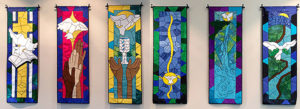Come to the Waters
Lesson Six

Waters of Justice and Righteousness—Justice
Scripture: Amos 5:21-24 (Blog inspiration includes all of Amos 5)
“I hate, I despise your festivals, and I take no delight in your solemn assemblies.
Even though you offer me your burnt offerings and grain offerings, I will not accept them;
and the offerings of well-being of your fatted animals I will not look upon.
Take away from me the noise of your songs;
I will not listen to the melody of your harps.” (Amos 5:21–23)
Ouch! The text for this month’s lesson opens with words that send a shiver down my spine. When my children were young, if one of them used the word “hate,” I would gently remind him or her that “hate is a very strong word.” It was a caution to all of us to be careful when choosing our words. Certainly there were times when strong words were appropriate, but it was important in our family to remember that such words were not to be spoken casually.
In our passage this month, God speaks through Amos to a people who believe they have it all together. On the surface, Israel appears to be a model of strength and prosperity. But God knows that the veneer is thin, and just beneath the facade of faithfulness lies corruption, abuse, and greed that bring wealth and power to some at the expense of others. Because of the way the people are living, God even finds their worship to be shallow and only for show. God wants to have no part of it. In fact, God hates it. God even despises it. Yes, it is strong language, but the words are not used casually. The reader gets the idea that God wants to be very clear.
I have wrestled with this lesson for weeks, struggling for a way to begin this blog. I know that whenever I struggle with a text, it is usually because I find (or fear) myself to be in it. It is tempting to think that these words were directed at ancient Israel, believing that the message is part of history and, while interesting, doesn’t apply to contemporary communities, certainly not our own. Certainly not to me! But to go down that road is to miss the opportunity for grace and growth that honest reflection brings. The discomfort of the wrestling turns out to be a gift.
Before I can reflect on whether the words of the prophet apply to me and/or my community of faith, I must first ask myself what is the true nature of God? What does God want from me? What does God want from us as a community? Chapter 5 of Amos starts with a litany of accusations, listing all of the things that Israel is doing poorly. But tucked in between the list of wrongdoings, we find these lines of relief and hope:
“Seek me and live.” verse 4b
“Seek the Lord and live.” verse 6a
“Seek good and not evil, that you may live, and so the Lord, the God of hosts, will be with you, just as you have said. Hate evil and love good, and establish justice in the gate; it may be that the Lord, the God of hosts, will be gracious to the remnant of Joseph.” verses 14–15
In verse 24, after the words of hate, the mood shifts suddenly and we find these words in which God is explicit about what God seeks from us:
“But let justice roll down like waters, and righteousness like an ever-flowing stream.”
The author of our Bible study, Judy Fletcher, defines righteousness as “right living, living according to God’s wishes. It is the way we live when we keep covenant with God. It is more than just following the rules. It is doing and wanting to do the right thing, which results in a right relationship with God.” She goes on to say that “Justice is the framework for our living. Justice can apply to laws or codes of conduct that make righteousness possible.”
Now that we know what pleases God, we may begin asking ourselves if our lives, both personal and corporate, reflect justice and righteousness. What might righteousness and justice look like today? Do we want to do the right thing, not out of guilt or obligation, but from a place of love, generosity, and gratitude? When we see or experience injustice, are we willing to risk becoming aware of its underlying cause and then look for ways to change the framework? Or is it easier and safer to simply look the other way?
It may seem like a stretch to share the following example, but when I am wrestling with a text, insights seem to come from the most unexpected places, for “God is not limited by copyright laws to holy books.” (Ed Hayes, Secular Sanctity.) At any rate, please bear with me.
On a recent Sunday afternoon, after a morning of teaching, worship, and leading a lively confirmation class, I came home exhilarated and exhausted. I needed to simply rest, so I sat down in my reading chair, picked up the television remote and clicked. I wasn’t familiar with the show that came up, but I began watching, thinking I would probably fall asleep and this background noise would be as good as any. Almost immediately I was drawn into the program.
The show was called “Undercover Boss.” In this episode, the CEO of a home restoration company disguised himself and went to work “undercover” to see how the company was doing on the front lines with their workers in the lowest paying jobs. After working side-by-side with several employees for days, he learned that some were working second jobs simply to make ends meet. One had been promoted the year before, but because of a company-wide raise freeze to keep costs down (and profits up) her pay had never increased. Decisions the CEO had made from a distance were taking a toll on his employees. As he flew home on his personal jet, he was faced with painful justice issues that needed to be addressed. By the end of the program, after revealing his identity, he restored raises, gave bonuses, paid for more training and education for the employees, and began lowering his own executive expenses. In other words, he altered the framework of his company to benefit his employees. He wanted to do the right thing, to honor and respect those who worked with and for him. Justice. Righteousness. Right there on the Oprah Winfrey Network.
 On the back wall of the sanctuary at the church I serve, we have the PC(USA) banners that represent The Six Great Ends of the Church as found in the Book of Order. The Great Ends are:
On the back wall of the sanctuary at the church I serve, we have the PC(USA) banners that represent The Six Great Ends of the Church as found in the Book of Order. The Great Ends are:
• The proclamation of the gospel for the salvation of humankind
• The shelter, nurture, and spiritual fellowship of the children of God
• The maintenance of divine worship
• The preservation of the truth
• The promotion of social righteousness
• The exhibition of the Kingdom of Heaven to the world
The Worship Committee worked for a long time deciding just what to put on the large blank wall that would be enhance worship and be visually pleasing. Under the leadership of a faithful Presbyterian Woman, Donna Nichols, the designs were ordered, a gifted seamstress found and the banners were commissioned in early 2014. They were completed in August of the same year, just in time to begin a new season of Christian Education. It was an exciting day!
The banners do indeed enhance the space as well as the experience of worship. When I lead chapel with our preschool children, we often walk around the sanctuary and talk about different images on the banners. The banners are gorgeous, but their meaning goes far beyond the fabric, symbols and sequins. They remind us of what it means to be the Church, the Body of Christ, as God calls us to be faithful in this place and time. The fifth Great End, the promotion of social righteousness, has a sign beneath it with the words from Amos 5:24: “But let justice roll down like waters, and righteousness like an ever-flowing stream.”
This morning in worship, we sang the hymn, “Live Into Hope,” GtG 772. It’s one of my favorites, always stirring and inspiring. The bold words and vigorous melody charge me to be aware of those in our world who are not free and to recommit myself to looking for ways to work for the basic human rights. At times, I find that I am the one being held captive by old ideas, fear, greed, and more. While I love all of the verses, the third and fourth verses always bring tears to my eyes:
Live into hope of liberty, the right to speak, the right to be,
the right to have one’s daily bread, to hear God’s word and thus be fed.
Live into hope of captives freed from chains of fear or want or greed.
God now proclaims our full release to faith and hope and joy and peace.
May the Holy Spirit guide us to live in such a way that God will take delight in our assemblies, accept our humble offerings, and listen to the melody of our harps.
With love and a grateful heart,
Jo Ann Currie, Director of Christian Education & Spiritual Formation
First Presbyterian Church, Pasadena, Texas
